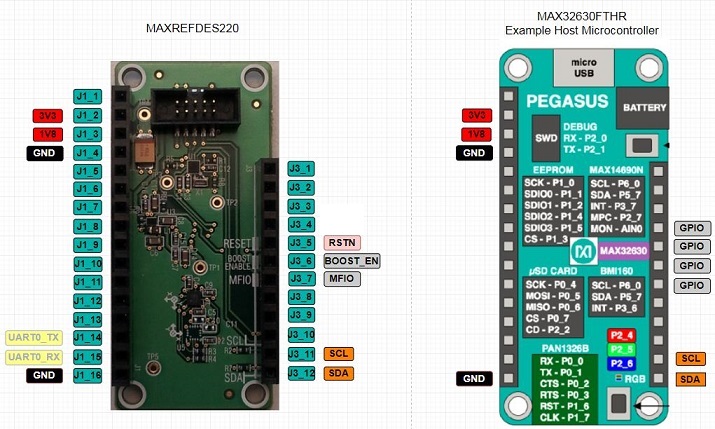Host software for the MAXREFDES220 Heart Rate Monitor Smart Sensor. Hosted on the MAX32630FTHR.
Dependencies: max32630fthr USBDevice
Fork of MAXREFDES220_HEART_RATE_MONITOR by
Finger Heart Rate Monitor and SpO2 Monitor
The MAXREFDES220 Smart Sensor FeatherWing board is a integrated solution for providing finger-based heart rate measurements and SpO2 (blood oxygen saturation). This evaluation board interfaces to the host computer using the I2C interface. Heart rate outpu is available in beats per minute (BPM) and SpO2 is reported in percentages.; the PPG (photoplethysmography) raw data is also available. The board has an MAX30101 chip which is a low power heart rate monitor with adjustable sample rates and adjustable LED currents. The low cost MAX32664 microcontroller is pre-flashed with C code for finger-based pulse rate and SpO2 monitoring. Bootloader software is included to allow for future algorithms or updates to the algorithm from Maxim Integrated.
Ordering information will be available soon.
Note: SpO2 values are not calibrated. Calibration should be performed using the final end product.
Warning
The MAXREFDES220 source code listed is dated and only compatible with the 1.2.8a.msbl. The latest sample host source code is available on the MAX32664 website.
MAXREFDES220 FeatherWing Pinout Connections

Utilities/LEDStatus.cpp
- Committer:
- Shaun Kelsey
- Date:
- 2018-05-24
- Revision:
- 6:af745c7b8520
- Child:
- 8:0f55f59ca341
File content as of revision 6:af745c7b8520:
/*******************************************************************************
* Author: Shaun Kelsey, shaun.kelsey@maximintegrated.com
* Copyright (C) 2018 Maxim Integrated Products, Inc., All Rights Reserved.
*
* Permission is hereby granted, free of charge, to any person obtaining a
* copy of this software and associated documentation files (the "Software"),
* to deal in the Software without restriction, including without limitation
* the rights to use, copy, modify, merge, publish, distribute, sublicense,
* and/or sell copies of the Software, and to permit persons to whom the
* Software is furnished to do so, subject to the following conditions:
*
* The above copyright notice and this permission notice shall be included
* in all copies or substantial portions of the Software.
*
* THE SOFTWARE IS PROVIDED "AS IS", WITHOUT WARRANTY OF ANY KIND, EXPRESS
* OR IMPLIED, INCLUDING BUT NOT LIMITED TO THE WARRANTIES OF
* MERCHANTABILITY, FITNESS FOR A PARTICULAR PURPOSE AND NONINFRINGEMENT.
* IN NO EVENT SHALL MAXIM INTEGRATED BE LIABLE FOR ANY CLAIM, DAMAGES
* OR OTHER LIABILITY, WHETHER IN AN ACTION OF CONTRACT, TORT OR OTHERWISE,
* ARISING FROM, OUT OF OR IN CONNECTION WITH THE SOFTWARE OR THE USE OR
* OTHER DEALINGS IN THE SOFTWARE.
*
* Except as contained in this notice, the name of Maxim Integrated
* Products, Inc. shall not be used except as stated in the Maxim Integrated
* Products, Inc. Branding Policy.
*
* The mere transfer of this software does not imply any licenses
* of trade secrets, proprietary technology, copyrights, patents,
* trademarks, maskwork rights, or any other form of intellectual
* property whatsoever. Maxim Integrated Products, Inc. retains all
* ownership rights.
*******************************************************************************
*/
#include "LEDStatus.h"
#include "Peripherals.h"
LEDStatus::LEDStatus(PinName red, int rstate, PinName green, int gstate, PinName blue, int bstate):
rLED(red, rstate), gLED(green, gstate), bLED(blue, bstate), blinking(false), timer()
{
}
void LEDStatus::set_state(int rstate, int gstate, int bstate)
{
r_act = rstate;
g_act = gstate;
b_act = bstate;
if (!blinking) {
rLED = r_act;
gLED = g_act;
bLED = b_act;
}
}
void LEDStatus::solid()
{
blinking = false;
rLED = r_act;
gLED = g_act;
bLED = b_act;
timer.stop();
}
void LEDStatus::blink(int ontime, int offtime, int nb)
{
ont_us = 1000 * ontime;
offt_us = 1000 * offtime;
count = 1;
total = nb;
blinking = true;
rLED = r_act;
gLED = g_act;
bLED = b_act;
bs = true;
timer.reset();
timer.start();
}
void LEDStatus::blink(int period, float duty, int nb)
{
ont_us = 1000 * period * duty;
offt_us = (1000 * period) - ont_us;
count = 1;
total = nb;
blinking = true;
rLED = r_act;
gLED = g_act;
bLED = b_act;
bs = true;
timer.reset();
}
bool LEDStatus::is_blinking()
{
return blinking;
}
void LEDStatus::update()
{
uint64_t time = timer.read_high_resolution_us();
uint64_t frame_time = time % (ont_us + offt_us);
if (bs && (frame_time > ont_us)) {
bs = false;
rLED = LED_OFF;
gLED = LED_OFF;
bLED = LED_OFF;
count++;
} else if (!bs && (frame_time <= ont_us)) {
bs = true;
rLED = r_act;
gLED = g_act;
bLED = b_act;
if (total > 0 && count >= total) {
blinking = false;
timer.stop();
}
}
}

 Heart Rate SpO2 Algorithm EvKit Health Monitor Development System Board MAXREFDES220
Heart Rate SpO2 Algorithm EvKit Health Monitor Development System Board MAXREFDES220